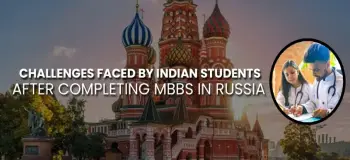Get in Touch
Need personalized assistance? Your solution starts here!

Get in Touch
OTP Verification
Enter the 6-digit code sent to your device
Time remaining: 3:00

Educationvibes
1598
Are you the one who has decided to study in Russia for your higher medical education, but are afraid of challenges? Don’t worry, this guide is all about analyzing the common challenges of MBBS in Russia for Indian students and providing the solutions on how you can mitigate those challenges to become a successful doctor.
Studying MBBS in Russia has no doubt been an appealing option for many Indian students, especially those seeking affordable medical education. Russian medical universities are very popular for offering high-quality education with reasonable tuition fees, making it an attractive choice for aspiring doctors. In this article, we’ll explore the challenges of MBBS in Russia for Indians, especially after returning to India, covering issues like career prospects, recognition of degrees, and more.
Studying in Russia is an excellent option, but one of the major challenges after completing MBBS in Russia is ensuring that the degree is recognized in India. Most Russian universities are NMC and WHO recognized, but Indian students still need to pass the Foreign Medical Graduate Examination (FMGE), also known as the MCI screening test, to practice medicine in India.
The FMGE exam is a significant hurdle. Despite completing medical education in Russia, many students struggle to clear it. This exam evaluates the knowledge and clinical skills required to practice medicine in India, and lack of practice often makes passing difficult.
Key Takeaway: Indian students must be well-prepared for the FMGE and consider it a crucial step in their career journey.
For students who wish to pursue post-graduate studies after MBBS in Russia, the journey can be challenging. The competition for MD/MS seats in India is fierce, and foreign graduates often find it harder to secure a seat. Exams like NEET-PG are highly competitive, with Indian medical graduates also in the race.
This can be frustrating for students who had high expectations for specialization after MBBS.
Key Takeaway: Students should be aware that pursuing post-graduate education in India can be more competitive after MBBS in Russia. Planning ahead is essential.
Another issue Indian students face is adapting to Indian medical practices after returning from Russia. The healthcare systems, patient demographics, and treatment protocols in Russia differ greatly from India. As a result, many students feel underprepared for clinical challenges when they start practicing in India.
Key Takeaway: The transition can be tough, but with consistent practice and adjustment, Indian students can overcome this challenge.
Passing the FMGE remains one of the most significant challenges for Indian students. Even if trained in English-medium courses, the exam structure is different from Russian medical exams. FMGE focuses on Indian medical practices, which may not align with Russian training.
Students are often advised to take coaching or self-study, but despite preparation, the FMGE failure rate is high. This can delay medical careers and cause stress.
Key Takeaway: Thorough preparation for FMGE is essential to ensure a smooth transition into practicing medicine in India.
While tuition fees in Russia are affordable, students must also consider expenses like accommodation, travel, and living costs. Delays in finding a job or internship due to recognition challenges can also create financial pressure.
Key Takeaway: Students should plan their finances carefully, accounting for both study expenses in Russia and exam preparation costs after returning to India.
Returning to India after years in Russia can have a psychological impact. Many students experience isolation, anxiety, or depression while readjusting to Indian life. Added to this are family and societal expectations to succeed after investing heavily in education abroad.
Key Takeaway: Students must prepare mentally for the transition and focus on building a support system to cope with these challenges.
During their stay in Russia, some Indian students face cultural barriers and even racial discrimination in day-to-day life. This sense of alienation can sometimes continue after returning to India, as reintegration into society may feel difficult.
Key Takeaway: Being aware of cultural differences and staying prepared for them can help students adjust better both abroad and at home.
Completing MBBS in Russia offers Indian students affordable, quality education, but the challenges after returning to India are significant. Recognition of degrees, clearing the FMGE, adapting to Indian medical practices, post-graduate competition, financial strain, and psychological or cultural adjustments are some of the major hurdles.
By preparing thoroughly for FMGE, planning finances wisely, and being mentally ready for cultural and professional transitions, students can overcome these challenges. Medical education in Russia is a great opportunity, and with the right preparation, Indian students can successfully build their medical careers.
Related Blogs
Challenges of MBBS in Russia for Indians: A Guide
From Classroom To Clinical Practice: MBBS Students in Russia Get Support They Need
Things to Know in Mind Before Flying to Russia for MBBS
Medical Education In Russia – Everything You Should Know
Russia Medical Colleges for Indian Students
